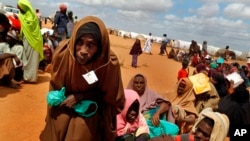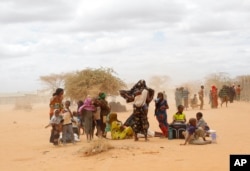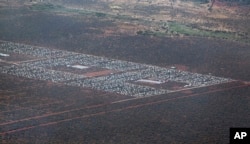A Kenyan official has said the country may not be able to meet its self-imposed deadline of November 30 to close the huge Dadaab refugee camp. Tens of thousands of Somalis have left the camp in recent months, but they are finding it impossible to scratch out a living back in Somalia.
Monday, Reuters news agency quoted an Kenyan interior ministry official as saying the deadline for closing Dadaab will not be met, because Somalia cannot provide basic services to the returnees.
The ministry has not issued an official statement, and the spokesman declined to comment when contacted by VOA Tuesday.
But it has become clear that Somalis returning home are facing dire humanitarian conditions, including a lack of shelter, clean water, health care and food.
According to the United Nations refugee agency, more than 34,000 refugees have gone back to Somalia, with most settling in the port city of Kismayo.
The vice chairman of the refugee and IDP agency in Somalia's Jubaland region, Mohamed Noor, says there are no essential social services in place to cater for the returnees.
Noor says the returnees had a good life, good health services, and their children were in school getting an education in Dadaab, but when they got to Kismayo there was nothing for them, so his agency decided to stop receiving people temporarily.
Jubaland authorities have refused to accept more returnees from Dadaab for the time being, saying they could not cope with the number of returnees.
Amnesty International’s Deputy Director for Africa Michelle Kagari says Kenya's government is coercing refugees to return to Somalia, where they risk being injured or killed in the chronic conflict.
“We have also reviewed the surveys done by the UNHCR, Kenya, and MSF which found a vast of Somalis in Dadaab did not want to return, so on that front we found out that these returns can in no way be seen as voluntary," Kagari said.
Kismayo’s deputy mayor Abdi Ibrahim Abdi Barre agrees. He says there is nothing to show the returnees have received assistance. He says those repatriated from Dadaab were released to fend for themselves with a stipend that is not enough to live on and are back looking for support.
Some observers fear some of the returnees, mostly children and young men, may be forced to join al-Shabab.
Kagari says some returnees faced threats and persecution for failing to cooperate with militants.
“There were two boys in particular whose father was killed in front of them they were forcefully recruited into al-Shabab they managed to escape after four months and made their way back to Kenya now they are being required to go back again ... Anyone who is returned to Somalia will likely face persecution," she said.
The UNHCR and humanitarian agencies have come under pressure to suspend the repatriation process until the situation in Somalia improves.






